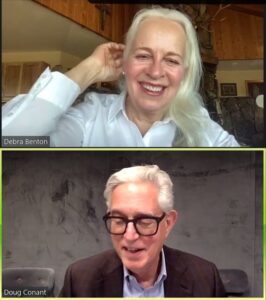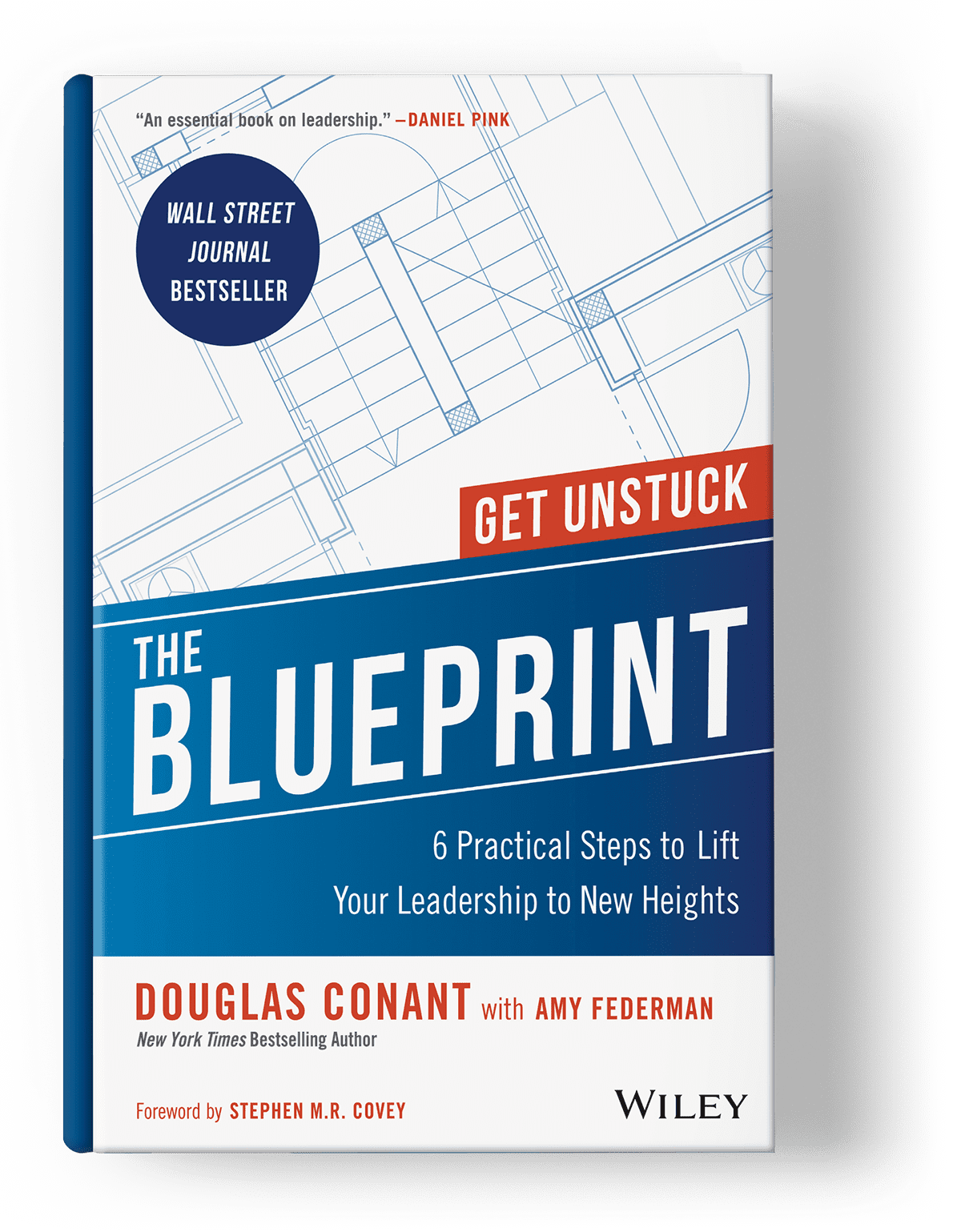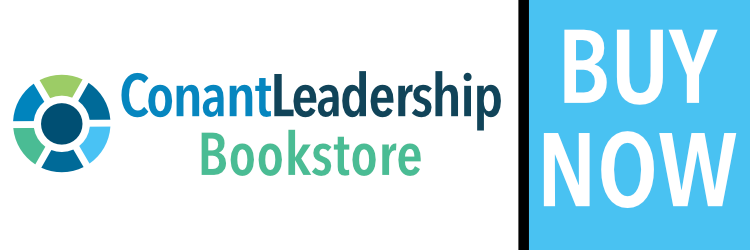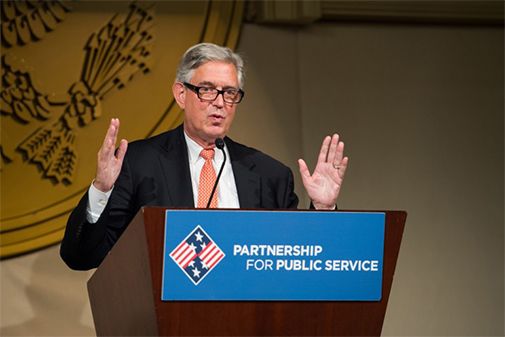Two Leadership Experts Say the Path to Courage Starts with Taking “Just One Step” Closer to Other People
At ConantLeadership’s most recent BLUEPRINT Leadership Summit—a bi-annual virtual meeting of top leadership luminaries—Debra Benton (Founder and President of Benton Management Resources and bestselling author of How to Think Like a CEO) spoke with Doug Conant (Founder of ConantLeadership, former CEO of Campbell Soup Company, and bestselling author of The Blueprint and TouchPoints) about how to challenge your assumptions, lead with courage, and take small steps that push you out of your comfort zone.
Enjoy the following tips and takeaways from their conversation in this blog recap. You can also find their full discussion in our video library (skip to roughly minute 5 to skip intros and housekeeping).
 Small Steps Make a Big Impact
Small Steps Make a Big Impact
In the early 1990s, Doug Conant was trying to find his footing as an executive at RJR Nabisco in the tumultuous aftermath of the company’s historic LBO—the leveraged buyout made famous by the book and movie, Barbarians at the Gate. He had moved from the Midwest to the NYC metro area to work at Nabisco and found that his shy, honest, and humble—yet tough-minded—approach to delivering high performance was often at odds with the hyper-challenging corporate culture of the private equity world. Sometimes he felt like he had wandered into a foreign country. Although Conant was a fish out of water, he was also a fierce competitor and hard worker; he was determined to make an impact.
At Nabisco, Conant found good people at all levels who wanted to succeed but who were also traumatized by the LBO and wary of newcomers, especially outsiders like him with a more quiet leadership style. Somehow, he needed to build trust with the group, and quickly. He got to work developing a wide-ranging set of trust-promoting behaviors. One practice, which he learned from Debra Benton, had a profound impact. At the time, Benton had recently written the leadership book, Lions Don’t Need to Roar, and Conant, looking for advice, traveled to Denver to meet with her. As an introvert who was now “swimming in the shark tank,” he was hoping for actionable guidance on how to lead in a new and demanding environment.
During their one-day meeting in Denver, Benton (among many things) gave Conant a simple yet profound practice that ultimately changed everything. She suggested that for the next seven days, in every interaction, he should simply get “just one step closer” to other people: “In your conversations, when you’re in meetings,” even when standing in front of a group, “just take one step closer to the audience.” While Conant was initially skeptical, the advice did make sense given his tendency as an introvert to distance himself from others without realizing it. The thought of encroaching, however slightly, on people’s personal space made him uncomfortable. But in the interest of earning greater trust with the team, he was willing to try it—at least for a week.
The next week, Conant put Benton’s words into practice and took that small step forward—literally and figurately. It was a subtle adjustment that he says transformed his leadership and became “part of a portfolio of things” that increased his impact “in a way I could get comfortable with.” In the years since, the “one step closer” rallying cry has become a metaphor for his way of operating, a leadership approach that values interpersonal connection and a “people first’ spirit.
As the two leaders reminisce about those early days, Conant asks Benton to share what drives her as an executive coach and author who has worked with leaders from Microsoft, Pepsi, NASA, Kraft, Deloitte, and more. To explain, she fondly recalls a comment from a client who told her that by pushing people out of their comfort zone she, “helps a young pup become a top dog.” Both panelists agree that this kind of leadership growth requires courage. It starts with the right mindset. And the willingness to take that first step forward, no matter how uncomfortable.
Benton adds that impact is about personal agency: “You can’t control the world, but you can control yourself and the effect you have on others.” She says that high-performing leaders, no matter where they are in their career, understand the critical need to “expect acceptance of who they are” and then “take baby steps” forward without fear. Benton asks leaders to find small ways to challenge themselves e.g., “step up, raise your hand, speak up, do something a little different.”
Conant agrees that small actions yield large results, “because you start to develop habits that can be life changing.” And he echoes Benton’s message about individuals’ power to change their behavior and outcomes. Conant shares the “ten two-letter words” he learned years ago that hold the secret to success: “If it is to be, it is up to me.” He follows up with a related lesson from Viktor Frankl who famously wrote, “between stimulus and response, there is a space. And in that space is our power to choose our response.” He says that both quotes speak to the importance of being intentional, akin to a choose-your-own-adventure story meant for the real world.
Do What Others Don’t Do
For many people, the mere mention of courage might conjure images of adventurous skydivers and mountain climbers. But that’s not the type of courage the panelists say is critical for leaders. They say to bring bravery down to Earth: Jump into tough conversations instead. Scale the mountains in your inbox, on the manufacturing floor, in the conference room—wherever you’re called to lead. And they add that leadership doesn’t always have to be serious: “It takes courage to use humor and be good natured,” says Benton. “Inject some levity. Do what others don’t do.” She encourages leaders to stand apart: “Intelligently observe” the crowd and then forge your own path because, “it’s courageous not to follow the trend, not to follow what everybody’s saying.”
In the spirit of going against the grain, much of Benton’s work involves helping leaders reverse their negative self-talk. She says that perfectionism can be dangerous and that your internal dialogue either helps or hinders how you present yourself to the public. Benton says to shift your self-talk to “I’m adequate” and then have the courage to “come to the table” as you are. This is especially relevant in her work with women, some of whom are historically hesitant to step into their power because they’ve been socialized as overly humble or modest. (The panelists note that women’s representation in the C-suite is the highest it’s ever been and take it as a sign that courageous leadership is on the rise.)
One listener submits a question: “Why shouldn’t the goal of self-talk be that we are good or outstanding, rather than adequate? “You’re either adequate or inadequate,” Benton responds matter-of-factly, explaining that self-talk can be an exercise in simplifying expectations. It’s admirable to aim for greatness but if feelings of not being good enough are holding you back, adequacy can be an approachable first step.
Building on the idea, Conant offers an egalitarian reframe: “If your objective is to be grand and great, you’re sort of putting the people you’re with down below you.” Benton agrees that a collaborative spirit is best: “In a career, you get pulled up from above by doing good work, but pushed up from below by the people you teach and inspire. And so it’s not just about you, it’s never just about you.” She adds that leaders should make sure to “share the glory with people,” and “give them credit” for making things happen too.
Benton also says switching to an “I’m adequate” self-talk script supports the practice of learning to expect acceptance as you move through the world. She reiterates that “your brain believes what you tell it,” so when you start believing you’re worthy, you develop the gumption to make behavioral adjustments. She again advises starting small to build the courage skill: “If you always go into the Monday morning meeting and sit in one chair, sit in the chair on the opposite side. Or maybe stand this time. Do something a little different and do that more and more.” People will notice. And as you’re strengthening your own self-esteem, be sure to lift others up too: “The most courageous thing you can do is make others feel good about themselves when they’re around you,” says Benton.
Optimism and Curiosity Help You Move Forward
Conant, in his over 45 years of leadership experience, has observed that the ability to make incremental changes, push through discomfort, and lead with courage all stems from a positive outlook. Optimism is crucial: “I don’t know many highly successful pessimists,” he says. And research backs him up, showing that optimists may not only be more resilient professionally but may even live longer than their gloomier counterparts. Looking on the bright side is a competitive advantage, which further reinforces the need for leaders to improve their self-talk if they want to unlock their full potential. Benton clarifies that blind optimism isn’t the answer here, but rather an intentional perspective shift, and a willingness to ask, “what’s worked well?” and, “how can we make this work better?”
Both panelists say that this type of pragmatic optimism—and the curiosity that comes with it—is a disruptor for good. “In general, you can never go wrong by asking questions and being curious,” says Benton. She attributes her own strength as a mentor and executive coach to inquisitiveness. With each client, she seeks to understand what they do well, what they can build on, and what the people around them might be able to add. Benton says that adopting a curious style is a marker of success because it motivates managers to truly lead—to guide others on their own expeditions of courage.
Conant concludes with a hopeful reminder for leaders to never stop learning: “If you become a student of the craft of leadership, you will open doors for yourself [and others] that can lead anywhere.” A kindred spirit for the cause, Benton closes with an inspiring invitation: “Have the courage to say what needs to be said. Have the courage to take risks,” and commit to continuous improvement, “you can do it every day in small ways.”
Enjoyed these insights?
Watch the recordings from all six of our past BLUEPRINT Leadership Summits in our video library here, including illuminating conversations with Brené Brown, Susan Cain, Indra Nooyi, Amy Edmondson, Bill George, and many more. Then, save the date for our upcoming spring 2024 Blueprint Leadership Summit on April 22-26 here.
 About the author: Vanessa Bradford is a freelance content writer and copywriter, and C3PR’s Content Marketing Director.
About the author: Vanessa Bradford is a freelance content writer and copywriter, and C3PR’s Content Marketing Director.
(Cover photo by Mette Køstner on Unsplash)






0 Comments